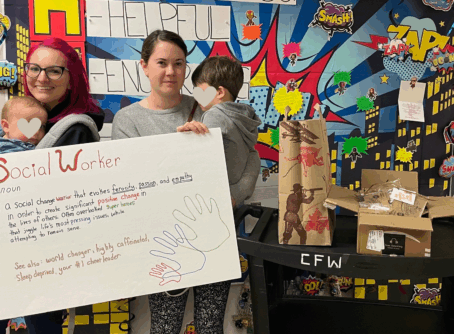
On June 27, 2025, the U.S. Supreme Court issued a 6–3 ruling in Mahmoud v. Taylor, holding that public schools must allow parents to opt their children out of classroom content that conflicts with their sincerely held religious beliefs. The majority opinion, authored by Justice Samuel Alito, affirmed a constitutional principle often spoken of but rarely applied: that the right of parents to direct the religious upbringing of their children does not vanish once those children walk through the doors of a public school. Alito wrote: “LGBTQ+-inclusive” storybooks—combined with its decision to withhold notice and opt-outs—unconstitutionally burdens their religious exercise. … The parents are likely to succeed on their claim that the Board’s policies unconstitutionally burden their religious exercise.”
Family as Institution
But beneath the surface of this headline-making parental rights case lies something deeper, more often ignored in today’s legal and political frameworks: a question of institutional religious freedom. This case is not merely about the conscience of the individual, or one set of individual rights clashing with another. It is about the religious and moral authority of the family as a foundational institution, and the ways in which government policy either upholds or erodes that authority.
Too often in American politics, we frame every conflict through the lens of individual rights. On the political right, freedom is understood as the absence of interference—the ability of individuals to act unencumbered by the state, particularly in economic, environmental, or personal domains. On the political left, freedom is often recast as the state’s duty to affirm and materially support each person’s self-expression, identity, and individual fulfillment. In both cases, the assumption is that the individual is the sole or central unit of analysis. Civil society institutions—families, religious communities, and schools—are flattened or ignored.
Mahmoud v. Taylor demands a different frame. It asks whether government can compel families to expose their children to contested ideological material about gender, sexuality, and identity—material that not only contradicts the religious teachings of those families, but does so in a way that interferes with their sacred calling to form the hearts and minds of the next generation. The Court’s answer, at least in this case, was no.
At issue were over 20 new storybooks introduced into the Montgomery County Public Schools’ PK–8 curriculum, part of an effort to increase inclusivity. These books, however, did more than promote dignity and respect. Many introduced young children to concepts such as gender self-identification, drag culture, and Pride symbolism—often in ways that were developmentally inappropriate. One book for ten-year-olds asked them to reflect on what it means to be “non-binary.” Another asked three- and four-year-olds to match terms like “leather,” “underwear,” and “intersex flag” to images. Still others portrayed religious concerns as outdated, shaming characters who expressed any hesitancy about new norms around sexuality.
Initially, the school district offered an opt-out policy. But in March 2023, that policy was revoked. Parents were no longer permitted to withdraw their children from these lessons, even if the materials violated their religious beliefs or threatened to undermine the spiritual formation they sought to provide at home. Muslim, Jewish, and Christian families—coming together across religious and cultural lines—filed suit.
Parents as Primarily Responsible for Children’s Education
What’s at stake here is not merely a question of what books belong in a classroom. It is the deeper question of who forms the child—and under whose authority. The Center for Public Justice’ Guideline on Education affirms that parents bear primary responsibility for the nurture and formation of their children. Government, in turn, plays a supportive—not substitutive—role. It may assist families in meeting their responsibilities, particularly through public education, but it may not override or undermine the institutions entrusted with that sacred task.
Indeed, the family itself is not merely a collection of individuals. It is a formative institution with its own moral and spiritual purpose. And when government steps in to impose its preferred ideological narratives—while denying parents the ability to dissent—it violates not only individual conscience but also the institutional religious freedom of the family.
During oral arguments before the Court, attorney Eric Baxter warned that the school board’s refusal to accommodate opt-outs would open the door for any material—no matter how controversial—to be mandated. “The First Amendment demands more,” he said. “Parents, not school boards, should have the final say on such religious matters.”
Justice Alito echoed this concern. He pointed to one book in which a child, Chloe, expresses reservations about same-sex marriage, only to be corrected by her mother. “It portrays this—everyone accepts this except for the little girl, Chloe … But her mother corrects her: ‘No, you shouldn’t have any reservations about this.’”
Such moments are not neutral. They are formative—and formation belongs first to the family, not to the state.
Even Montgomery County principals expressed concern about the books’ tone, age-appropriateness, and dismissiveness toward religion. Two books were eventually withdrawn by the school board. And yet the board maintained its ban on opt-outs for the rest—an inconsistent policy that permitted religious exemptions in other areas (such as choir, band, or Valentine’s Day) but refused them here.
The Center for Public Justice believes that a just public order requires honoring the distinct roles of government and civil society institutions.
In education, this means two things: government should ensure equitable access to quality schooling for all children, and it should respect the diverse educational choices of families—religious or not—without coercing conformity to a singular worldview.
Montgomery County’s storybook policy fails on both counts. It withholds equitable treatment from families who object in good faith and conscience. And it uses government-funded education to enforce an ideological uniformity, rather than protecting pluralism.
As New York Times contributor Megan Stack noted, quiet opt-outs have long been part of public education in America. Even in progressive cities like San Francisco and Boston, parents are still permitted to excuse their children from sex education. Such mechanisms do not signal retreat from shared civic life. Rather, they are the civic safeguards that allow children to be educated without crushing the spiritual and moral authority of their families.
Public justice demands this kind of pluralism—not as permissiveness, but as a principled form of civic hospitality. When schools trample on the religious formation of children—especially during their most vulnerable, impressionable years—they are not promoting inclusion. They are eliminating the space in which difference can be dignified.
I moved to Montgomery County in 2012 as a single, newly minted lawyer serving in a local church. I watched as families struggled with whether their values still belonged in the public square. Now, as a mother myself, I carry those same questions in a deeper way. We want our children to grow up kind and open-hearted. But we also want them to inherit the sacred stories and moral frameworks that give meaning to their lives.
The Mahmoud decision affirms that parents do not surrender their sacred duties when their children attend public school. But more importantly, it invites us to reexamine how we structure public education itself. Can schools uphold both equity and plurality? Can they educate without colonizing the spiritual space of the child? Can the sacred—and the institutions that carry it—be honored as legitimate actors in the formation of public life?
Conclusion
At its heart, this case is not just about opt-outs. It is about whether the state recognizes the family as a religiously formative institution with a moral vocation that predates the state and must be protected from it. And it is about whether religious communities—churches, mosques, synagogues, schools, and service organizations—can continue to shape public life without being told to check their sacred commitments at the schoolhouse door.
Religious freedom, rightly understood, is not simply the right to believe in private. It is the right of institutions to form, teach, and cultivate sacred meaning in the lives of their members—and to do so without state interference. That is the real promise of the First Amendment. That is the true measure of public justice.
Chelsea Langston Bombino is a believer in sacred communities, a wife, and a mother. She serves as a program officer with the Fetzer Institute and a fellow with the Center for Public Justice.
Key Takeaways:
- The right of parents to direct the religious upbringing of their children does not vanish once those children walk through the doors of a public school.
- Parents bear primary responsibility for the nurture and formation of their children. Government, in turn, plays a supportive—not substitutive—role.
- The family itself is not merely a collection of individuals. It is a formative institution with its own moral and spiritual purpose.
- Formation belongs first to the family, not to the state.
- Government should ensure equitable access to quality schooling for all children, and it should respect the diverse educational choices of families—religious or not—without coercing conformity to a singular worldview.
- We want our children to grow up kind and open-hearted. But we also want them to inherit the sacred stories and moral frameworks that give meaning to their lives.
- Religious freedom . . . is the right of institutions to form, teach, and cultivate sacred meaning in the lives of their members—and to do so without state interference.



